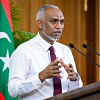Press Freedom: A Vital Element for Democracy

In 1993, the United Nations General Assembly declared May 3 as World Press Freedom Day. It is a day to celebrate the fundamental principles of press freedom, to evaluate press freedom around the world, to defend the media from attacks on its independence, and to pay tribute to journalists who have lost their lives practising their profession.
A free and independent press is a vital element in any democracy. It gives citizens the information they need to hold their leaders accountable and promotes economic development. The right to press freedom is enshrined in the founding documents of the United Nations as well as in many national constitutions.
The Universal Declaration of Human Rights, adopted by the United Nations General Assembly in 1948, recognises the importance of freedom of expression. Article 19 states, "Everyone has the right to freedom of opinion and expression; this right includes freedom to hold opinions without interference and to seek, receive and impart information and ideas through any media and regardless of frontiers."
By protecting press freedom, we uphold our shared values of democracy and human rights. Journalists must be able to cover issues without fear of harassment, intimidation or violence. This is necessary to support good governance and ensure that the public is fully informed. Additionally, journalists must have access to information and be able to protect their sources.
The Media Freedom Coalition consists of like-minded countries that advocate for media freedom and the safety of journalists around the world. The undersigned countries of the Diplomatic Network Initiative of the Media Freedom Coalition in Bangladesh are pleased to commemorate the 30th anniversary of World Press Freedom Day today.
As members of the Media Freedom Coalition, we underscore the importance of recognising the value of press freedom and of protecting it. This concerns governments, owners of media organisations, civil society leaders, political parties, and international organisations. By protecting media freedom, a society can become more inclusive and prosperous. Studies have shown that countries with more press freedom have greater economic growth. The reason for this is simple: a free press promotes transparency, which increases accountability as it helps reduce corruption and fosters innovation, supporting a business-friendly environment.
A free press is also essential for promoting human rights and social justice. Journalists play a critical role in exposing human rights abuses and violations, and promoting accountability. This is true for every country where a free press exists. Journalists can also promote gender equality by ensuring that women's voices are heard, and their experiences represented.
By ensuring press freedom, a sound basis is set for societies to develop and to improve through open discussions. The members of the Media Freedom Coalition in Bangladesh enthusiastically look forward to continuing this conversation with all parties.
Signed,
The embassies and high commissions of Australia, Canada, Denmark, France, Germany, Italy, Japan, Netherlands, Norway, Spain, Sweden, Switzerland, United Kingdom, and United States.

 For all latest news, follow The Daily Star's Google News channel.
For all latest news, follow The Daily Star's Google News channel. 







Comments